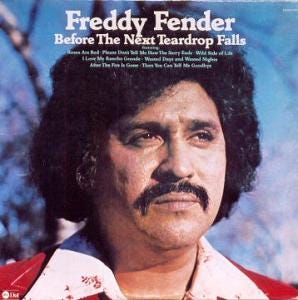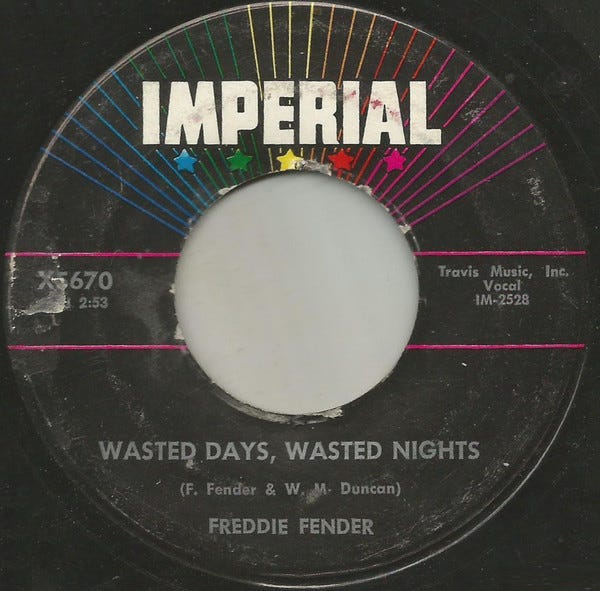“Before the Next Teardrop Falls” by FREDDY FENDER
The first bi-lingual #1 hit came at a bend in a long, hard road.
You try to be strong but the pain keeps holdin' on
The session took just a few minutes, and Freddy Fender was glad when it was over. He never liked country music, and it was only after a number of other ideas, including a Jamaican reggae song sung in Spanish, plainly didn’t work that producer Huey P. Meaux convinced him to sing over an instrumental cut by an anonymous Nashville band. Fender was in his late 30s, working as a mechanic and playing weekend club gigs now that he was no longer barred from working at businesses that sold alcohol by the conditions of his parole. Drinking his way out of the Marines, the two and a half years in Louisiana's Angola prison for marijuana possession, smoking three packs a day — his fluttering high tenor was untouched by it all. Fender sang the the first verse of the ballad in English and the second in Spanish, then some overdubs for the chorus, and that was it: “Before the Next Teardrop Falls,“ the Country Music Association's Song of the Year for 1975 and a bilingual #1 pop hit.
He was born Baldemar Huerta in 1937 in the poor neighborhood of El Jardin in San Benito, TX. The small city is a 45 minute drive down the coast to Matamoros, Mexico and has a small museum marking its place as the birthplace of conjunto. Conjunto is the traditional music of Tejanos, a border amalgamation of ranchero music and Czech and German polkas. A 10 year-old Baldemar made his radio debut singing a conjunto hit of the time, “Paloma Querida.” Even though his sensitive, darting vocal style was perfect for conjunto’s love ballads, by the time he was back from his shortened stint in the Marines, he was known as Eddie con los Shades and playing rockabilly in bars and honky tonks. As El Bepop Kid, his Spanish language covers of songs like Elvis’ “Don’t Be Cruel” (“No Seas Cruel”) were the first rock ‘n’ roll songs to top the charts in Mexico and South America. In 1958, he legally changed his name to Freddy Fender: Fender after the guitar, and Freddy because the alliteration sounded good and would “sell better to the gringos.”
The gringos took real notice in 1959 with Fender’s self-penned “Wasted Days and Wasted Nights,” a glorious mix of his Tejano rockabilly and the more R&B-inflected swamp pop billowing west of New Orleans. The jangly ballad is driven by a more insistent rhythm than most tear-jerkers, the quicker tempo requiring more hip action even from couples slow dancing with leave-room-for-Jesus distance between them. The song was a regional hit, and to aid Imperial Records’ forthcoming national push, Fender shaved his sideburns in an effort to look less Mexican. He still looked plenty Mexican, however, when he was rousted in Baton Rouge with two joints in his pocket, which sent him to the Louisiana State Penitentiary and, before such a time when that bust would have given him street cred, ended his career in the music business.
“This song was written by the great Freddy Fender. Freddy, this is for you, wherever you are…” so begins the 1971 cover of “Wasted Days and Wasted Nights” by Sir Douglas Quintet. The band’s name may have been concocted as British Invasion bait, but its accent was all San Antonio. They had a hit in with Meaux in 1965’s “She’s About a Mover” before heading west to mine psychedelic San Francisco and then coming back home to Texas to fly the flag of their Tex-Mex influences. Doug Sahm, the titular Douglas, subsequently found where Freddy was and invited him to play a series of Austin gigs. Those shows gained a new audience for Fender and led him in the direction of Meaux’s studio. Fender hoped Meaux1, who had also done jail time, would understand him and help find the swamp pop groove he craved. What he got was a career in county music.
If he brings you happiness
Then I wish you all the best
It's your happiness that matters most of all
But if he ever breaks your heart
If the teardrops ever start
I'll be there before the next teardrop falls
“Before The Last Teardrop Falls” is a cry-in-your-beer ballad of unrequited love. It’s such a common country music trope that it’s easy to see why two previous versions of the song only just dented the charts — familiar enough to get played, not distinctive enough to be remembered. Even here, the hushed sound is almost comically solemn; the song could have been a bundle of country cliches if Fender had use for any of them. Where the twang would go, his voice instead quavers with emotion. His silvery tenor filigrees the melody, making poetry of the simple lyrics.
Verses two and four, the ones in Spanish, cleverly include accordion to evoke the conjunto that Fender didn’t have time for as a young man. The song has one foot in Nashville and the other in San Benito, and from them on, so would Fender. “Before the Last Teardrop Falls” topped both the country and pop charts, one of seven songs to do so in the ‘70s. Three more country chart-toppers followed, including a re-recorded version of “Wasted Days and Wasted Nights,” which also went #1 country and top-10 on Billboard’s Hot 100. He had 21 country hits in all between 1975-83.
San Benito’s new water tank is painted with Fender’s likeness. Below it sits the Freddy Fender museum, right next to the one dedicated to conjunto.
14 Song Playlist
Scenes from the 50 year career of Freddy Fender
Thank You
How’s the start of 2022 treating you? Still feel weird? It feels weird over here, which makes me extra thankful that there are songs to dive into each week. Please share the love when you have a moment.
Meaux, the “Crazy Cajun,” produced a string of R&B, swamp pop, and rock hits, but even beyond the usual practice of cheating artists out of their money, proved to be a shit-tier human being. His first conviction was in the late ‘60s for violating the Mann Act, where he drove an underage prostitute across state lines. Wikipedia summarizes his second conviction thusly: In 1996, a police raid of his office turned up thousands of Polaroids and videos of girls, mostly underage, in sexual situations.[Meaux pleaded guilty to two counts of sexual assault of a child, a drug possession charge, a child pornography charge, and another for jumping bail and briefly fleeing to Juárez, Mexico. He was sentenced to 15 years in prison and was released in 2007.




Awesome writeup this week. Thanks for the background on this track from my childhood. Had to go right over to Tidal and give it a spin as I haven't heard it in a few decades. Didn't know Al Green had covered it as well, but that version is really good too. Hope you & the family are well.